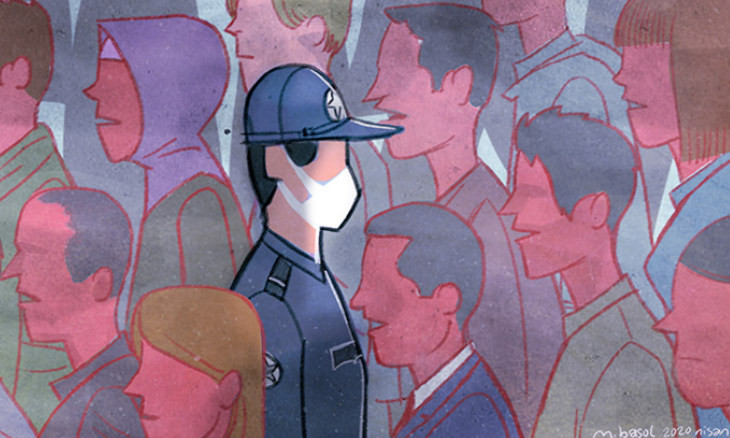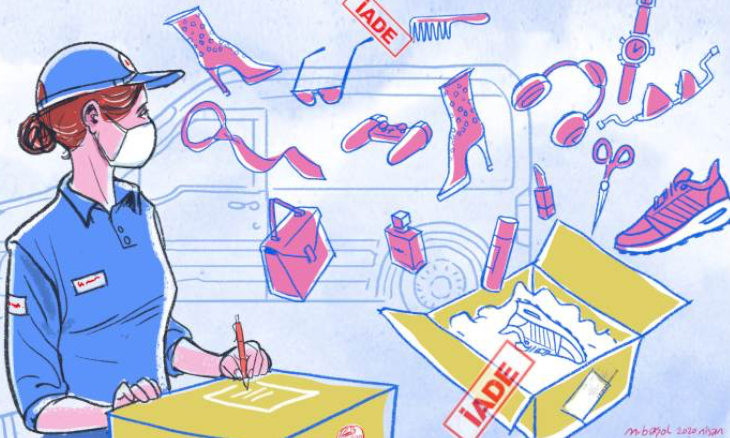Private sector miners in Turkey squeezed between hunger and death in the time of corona
Pınar Ögünç writes: In the depths of the mines, the conditions of workers, whose lungs are already strained, have gotten darker amid the coronavirus epidemic. While production has come to a halt in Turkey's state-run mines, most of those working in the private sector carry on squeezed between hunger and death. 35-year-old Ahmet, a miner who hails from the province of Zonguldak and has been working in the Soma mines, tells his side of the story.
Pınar Öğünç
35-year-old Ahmet, a miner who hails from the province of Zonguldak and has been working in the Soma mines for six years - the site of Turkey's worst workplace disaster in 2014, an explosion. In the depths of the mines, the conditions of workers, whose lungs are already strained, have gotten darker amid the coronavirus pandemic. While production has come to a halt in state-run mines, most of those working in the private sector carry on squeezed between hunger and death. Ahmet describes the fear experienced by the workers.
“How should I feel? In Soma alone we are told there are 100 positive cases. The reason for this is that the owners of privately run mines act as if they were the state. They can do as they wish with regards to workers. As of now, production carries on in three mines. In Soma, there are nearly 13,000 miners.
I've been a miner for the past six years. In the mine, there’s one air intake and one air release. When we first heard of the virus, we already feared that it spread rapidly. In Soma, there are people from all of Turkey's 81 provinces, and we had already said that those going on leave after March and then returning posed a risk. They wouldn’t listen to us.
One private mine declared that it was going to stop production on April 1, that no one would be given unpaid leave and that the workers would be leaving on their own accords. That was nonsense: they are forcing people to resign! While they claim that production has stopped, I’d like to ask about the 70,000 tons of production that took place between April 4-14. On top of the illness, we’re dealing with the pressure of our employers. And they forbid us to post anything on social media.
Though some workers know very well what’s happening, they repeat that production has stopped. Why is that? Because they are scared! But if several people said this instead of one, it could make a difference. We need unity. If necessary we, as the Independent Miner's Union, will speak up, and all the workers have to do is agree, but they refuse to! Fear prevents unity.
 Distance-teaching in a distant village in Turkey in the time of corona
Distance-teaching in a distant village in Turkey in the time of coronaAs of now, I’ve been put on my annual paid leave. But those who do not have annual paid leave are now unpaid. Eventually, I too will be on unpaid leave. As the number of coronavirus cases increased, the Turkish Miner’s Union (Maden-İş) managed to halt production at the mine in Zonguldak.
While those who work in state-run mines receive their salaries, why are those in the private sector left in hunger and death? Some politicians came here for the funeral of a fallen soldier a week or two ago, and a miner asked them: “The number of cases keep increasing, what do you think of the miners?” The politicians replied: “These things are beyond us, the mine should deal with this through connections from above.” What does this mean? Are employers running this country?
In Soma, everyone knows each other. Obviously there are people we know that have tested positive. A friend of mine said that eight people in that section had contracted the virus. When miners try to see doctors and nurses, they are confused and do not know what to do. Upon saying they come from the mine, doctors refuse to see them.
Personally, I'm the only one at home earning a salary, and I have two children. I suffered a workplace injury in 2017, and was put on sick leave for 17 months. But since we are exposed to carbon monoxide, every miner experiences problems with their lungs. At the end of the day, you are underground for seven hours. And the coronavirus targets lungs the most.
 The reflections of a hospital security guard: If I am lucky to find a mask I have to use it for 12 hours
The reflections of a hospital security guard: If I am lucky to find a mask I have to use it for 12 hoursI'm 35 years old, and I've been working since I was ten. I first worked as a shoe-shiner, then I sold Simit. I then worked in the textile and clothing sectors, later on as a heating technician, then at a clothing story, and finally as a miner. The most difficult job so far has been the mine. I'm from Zonguldak, and all of my uncles are retired miners. I had once said that I would never enter a mine, but I spoke too soon. That was my fate. For this mining job, I moved from Zonguldak to Soma. In Zonguldak, the situation is dire at the moment, the number of cases keep rising. Even in the tiny village that I used to live in, there are seven homes under quarantine. Some have died. In the city center however, people are being irresponsible. No one abides by the social distancing rules: the bazaars are totally full!”
On the day Ahmet spoke, the government announced 110,130 cases of coronavirus and 2,805 deaths.
Women, men, workers, civil servants, the unemployed, white-collar workers, blue-collar workers, those saying that the “collar” era has changed, freelancers, those who work at home, people still working, those forced to work, those under quarantine, those who can’t see the future, and those worn out from what they have seen are telling their stories.
The reason for having started this series of long articles is for hearing each others’ voices and searching for our own strength in those of others.
 'Online shopping during COVID-19 outbreak reveals the worst in Turkish people'
'Online shopping during COVID-19 outbreak reveals the worst in Turkish people'
